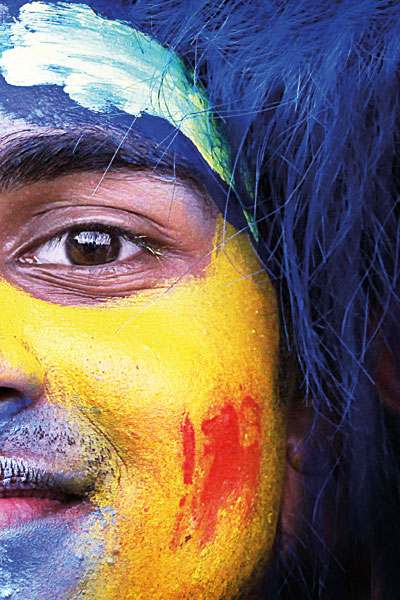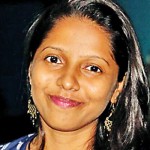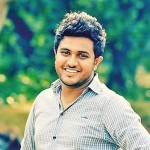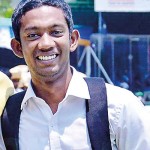Arts
How free do they feel?

Pic by M.A. Pushpa Kumara
At the dawn of the 70th anniversary of Sri Lanka’s Independence, the Sunday Times Magazine looks at this historic event, the culture and traditions built around it through the eyes of today’s youth. Born at least five decades after Independence, growing up through years of conflict, the experiences and ideas of Sri Lanka’s Millennials reflect how far, they feel, Sri Lanka has come since 1948.
Chathuri Kottage (22)
Bentota, Law student:
It is hard for Sri Lanka to become truly globalised because of the religious and cultural beliefs that prevail here, Chathuri feels. She believes that religion needs to adapt to some cultural changes, citing the issue of abortion and how Sri Lanka hasn’t accepted these changes because of the hold that religion and tradition have on our society. Women should have the right to consume alcohol if they want to, she adds.
Asked what a truly independent Sri Lanka would look like to her, she stated it would be where Sri Lanka would conform more to international standards and there would be more independence for women. The current male dominated society needs to change in her view.
Kanathy Kohularangan(20)
Jaffna, Law student:
The Tamil people were discriminated against and it was the majority perception that Tamils supported the LTTE if they were from Jaffna, Kanathy says. She now feels that the general public have accepted Tamils, and she sees how in the poorer areas Tamils and Sinhalese live in harmony.
A truly independent Sri Lanka to Kanathy is a place where Tamils have more of an identity, have a greater voice, and face less discrimination in suburban areas in Colombo.
Thilakshi Walpita (22)
Kadawatha, Sociology student: 
She used to enjoy hoisting a flag outside her home on Independence Day when she was a child but she notes that Sri Lanka’s Independence was granted because the British no longer wanted to remain here, not that it was won. Looking at the education system, she has sometimes felt that it would have been better if Sri Lanka was under British rule. Most of Thilakshi’s friends are trying to migrate to pursue their higher studies. Like her friends, she too feels that it is better to settle abroad than in Sri Lanka. In her opinion, this is not very different from preferring to live under foreign rule.
Shamil Akbar (22)
Colombo, Science student: 
Growing up, Independence Day to Shamil meant a school holiday and watching the Independence Day parades on TV. The political value of the Independence of 1948 was not the same as what his father may have felt, he says, as his father lived through it. Now, Independence Day to him is an icon that the nation looks up to, celebrating the efforts of Sri Lankans who achieved that independence and trying to learn from them. This is the only celebration that the entire Sri Lankan populace celebrates as one for their love of the country, Shamil said.
We can no longer look up to 1948 and expect what would have been there 70 years ago since Sri Lanka has changed in the course of time, but it could be an inspiration to become economically independent as a nation.
Thaveesha Warusavitarne (19)
Colombo, Business Management student
Thaveesha believes that Sri Lanka isn’t truly independent as there is influence from the UN and China. She believes that if Sri Lanka is truly sovereign then these external factors wouldn’t affect the country. For Thaveesha a truly independent Sri Lanka would be a country devoid of discrimination between peoples of different religions and races, where everyone could live in harmony. There should be more access for higher education, a more efficient healthcare system and more job opportunities,Thaveesha says, adding that the younger generation should be given a chance to participate in politics.
Saambaviy Sivaji (24)
Uduvil, Student of English:
Although Independence Day in Colombo is an important event, it is not so in the North, says Saambaviy. For her it is a holiday like any other. During the war people were given flags and it was compulsory that they hoist them. Schools and vehicles were given flags as well. Saambaviy feels that the post-Independence negotiations could have been more successful since they took place among rivalries of Tamil political leaders like Chelvanayagam and G.G. Ponnambalam.
For her, Independence means being able to do what she wants no matter what her race or ethnicity is. She believes that all people who lost loved ones in the civil war, regardless whether they are from the north or the south, should be able to memorialise the dead. She is sceptical about politics and power and said that unless progressive people take office, the devolution of power may not be able to make much difference.
Kanishka Werawella (22)
Peradeniya, Economics student:
Kanishka, says it is difficult for him to speak of how Independence has impacted his life, because he doesn’t know what life was like under colonial rule. Independence from Imperialism is good, but whether 1948’s declaration granted any such Independence is a question, he says. Kanishka’s family believed that 1948 was a turning point in Sri Lankan history and that it was an event to be valued. This influenced his perception of independence as a child. Yet it changed as he grew up.
Independence Day and the celebration of it is a ritual that nations practise globally, he says. He was always influenced by nationalistic ideals and believed that progress should be made as a country. Expressing his ideas about the devolution of power, Kanishka said he believed local governing bodies at the grassroot level must get autonomy and power for the betterment of the country.
Sivamshan Sivapalam (22)
Jaffna, Law student:
Sivamshan questions whether Sri Lanka is a truly independent nation because people in the north and east sometimes feel like they are different, not independent; that they can’t express their opinions freely. This is very subjective, he adds -living in Colombo he doesn’t feel that personally and feels able to express himself.
For Sivamshan a truly independent Sri Lanka would be a place where everyone is able to express themselves without hindrance and where everyone has autonomy. He wants minorities to have this right as well.
Zaitun
Colombo, Law student:
Zaitun states that what we have learnt from the Independence struggle is that being united as a country would do us a lot more good than being separated on ethnic and religious lines. The diversity in the country should be utilised so that it leads to unity and not separatism. Zaitun believes that the unity we had during independence should have been taken forward.
Zaitun believes that Independence comes from attitudes that promote mutual respect. Through that everyone has autonomy and this creates independence on a larger scale. The country is independent when the people are strong and have freedom of speech. You shouldn’t be swayed by majority opinion or minority opinion, all opinions should be taken into consideration, she says.
Chathura Perera (22)
Colombo, Marketing Executive:
Chathura feels that that Independence has not brought about any systematic changes. Independence Day has always been a holiday for him. He finds the military parades of less importance because the Sri Lankan military were not involved in the struggle for independence; instead personalities like Weera Puran Appu should be commemorated on Independence Day and even cultural parades should focus on such personalities, he feels.
Since Sri Lanka’s trains still run on rails laid by the white man, Sri Lanka would have been in a better place in the world if it had not received Independence, he says, adding that if Sri Lanka was also able to use dollars as its currency, the economy would be in better shape.
Devrangee Weerasinghe (22)
Nugegoda, Law student:
Peace and freedom are the immediate by-products of independence and for someone who grew up during the war, peace and freedom were never felt until its conclusion in 2009. Therefore in terms of national importance, the end of the conflict was deeply felt and was found more relatable for her generation compared to the Independence of 1948, Devrangee says.
Real Independence for Sri Lanka, she believes was when the first Republican Constitution was created rather than the immediate freedom from colonialism. She doesn’t feel it is something to celebrate on such a grand scale because of how it was received but she is grateful for the people that did push for Sri Lanka’s Independence. The 1972 Constitution, she says was made with our effort, and that is the Independence we strived for and rightfully got.
Stephanie Sansoni (22)
Kandy, International Relations student:
Stephanie always had a great sense of national pride. She remembers how Independence Day was celebrated in school and how her family hoisted a flag. Independence, for her, is an entity gaining freedom from external control. As a student of International Relations, Stephanie feels that over time she has come to understand that the word “independence” has a plurality to it and that the global dynamics of Independence is changing.
As a Burgher she had often heard her elders say that if the British had stayed, Sri Lanka would have been a more developed nation. But Stephanie felt that if things remained the way they were, Sri Lanka would have been another island under the enslavement of the colonizers. Stephanie feels that Independence is not possible in today’s world as it would require a country to be entirely self-sufficient.

